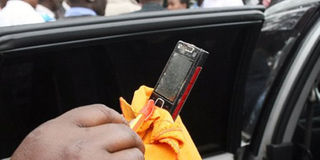Why gangs are targeting private motorists

A cellphone recovered from the scene after a Tax driver body late Richard Otieno was found body was discovered with bullet wounds . The Motorist was carjacked and Killed inside his car in Kileleshwa Area Nairobi. William Oeri ( Nairobi)
What you need to know:
- The survey showed that 41 per cent of crimes reported are violent robberies and residents in all parts of the city are prone to such attacks.
Edna Kawira was in the company of two friends last Saturday when they endured a traumatising experience. After a few drinks at a pub on Nairobi’s Ngong Road, they hired a taxi to The Mingle, a social event that was taking place at the Ngong Race Course.
“We took the driver’s phone number and told him that we’d call him to pick us up later,” says Ms Kawira.
At 11.30 pm, they telephoned the taxi driver. On their way to Brew Bistro on Ngong Road, the driver suddenly stopped. “We asked him why he had stopped and he said he had spotted some people who were stranded and needed help,” says Ms Kawira.
“He lowered the car windows and, suddenly, three men appeared wielding guns and ordered us out of the car. They robbed us and drove off in the car.”
In what she describes as an “inside job”, she lost an iPhone and Sh1,500 in cash. One of her friends lost a Blackberry phone while the other lost a phone and money.
The incident points to a worrying crime trend in the city. Gangsters in Nairobi have turned Kenya’s growing middle class into a cash cow and are increasingly targeting private vehicles.
This is a departure from the past when gangsters targeted mainly public service vehicles. In this era of expensive and portable technological gadgets, the criminals have directed their vice at the middle class.
The improving economy, coupled with high inflation, makes it highly possible that occupants of one private car could easily yield goods and cash worth more than Sh100,000. Police sources say that the city is experiencing an average of five carjackings every night.
On Monday, Jamal Abdi Noor was carjacked just after midnight on East Church Road in Westlands area and robbed of his saloon registration KBT 690U. By the time of filing this story, the car was still missing.
On Wednesday, Nairobi residents also woke up to news of a taxi driver, Richard Otieno, who had been carjacked and shot dead in his vehicle, which was found abandoned in Kileleshwa.
The taxi had been hired on Tuesday night outside Westgate Mall by people who wanted to be taken to Loreto Msongari. It is suspected that the car was used to terrorise other motorists throughout the night.
And on the same Wednesday at 7.30 pm in Thome estate, Oscar Ogutu, was waylaid at his gate by a gang that was driving a pick-up, KBF 786F. In the pick-up were two other victims – Lalji Mauji Rova and Ramesh Kerai – who had been carjacked in Ngara area at 7 pm.
The gangsters made away with Mr Ogutu’s household goods worth Sh250,000, Sh134, 000 in cash and the car. By the time of going to press the vehicle had not been recovered.
On the same night, Mr Edward Odongo returned to his house in Lang’ata and parked his car outside the gate as the parking lot inside was full. At around 10.15 pm, some cars had been driven out so he decided to move his car inside.
Two armed men ambushed and carjacked him. They abandoned him in Kileleshwa and fled with the car. The vehicle is yet to be traced.
Mr Caleb Wanga, the safety co-ordinator for Nairobi at the Usalama Reforms Forum, argues that the change in fortune for most Kenyans has lured gangs into targeting personal vehicles.
“When they carjack a matatu, they’ll find that some people have just Sh80 and a phone worth Sh1,500. There is no value in that,” says Mr Wanga. “But when they waylay a private car, it is possible to find the occupants with iPhones, iPads, laptops and even ATM cards with which they could withdraw cash.”
Nairobi police chief Benson Kibui advises city residents to co-ordinate with security guards as they head home and not to stop when flagged down by strangers, especially females, claiming to be stranded. “We recently gunned down a woman who was notorious for that,” he said.
“It is true that this is happening especially in the posh areas,” Mr Kibui told the Sunday Nation. “They are refraining from being ordinary thieves but as security agencies we are also getting smart.”
According to Mr Wanga, new settlement areas are sprouting due to the improving economy while the security agents are not widening their reach in equal measure.
“Besides, there are not good roads leading into some of these new settlements from the main road, making it easy for the thugs to prey,” he adds.
Police sources say unscrupulous officers are involved in the robberies. They also attribute the rising incidents to proliferation of guns in the country. In June last year, the Kenya Action Network on Small Arms (Kansa) said more than 600,000 firearms were in the wrong hands.
A week ago, Inspector-General of Police David Kimaiyo asked the Treasury to allocate Sh150 billion to fight crime. A recent survey commissioned by the government revealed alarming levels of armed robberies and other crimes in the city.
The survey showed that 41 per cent of crimes reported are violent robberies and residents in all parts of the city are prone to such attacks.
“The survey established that robbery and theft are the main types of crime in Nairobi region, accounting for 41.1 per cent and 34.9 per cent respectively.”




